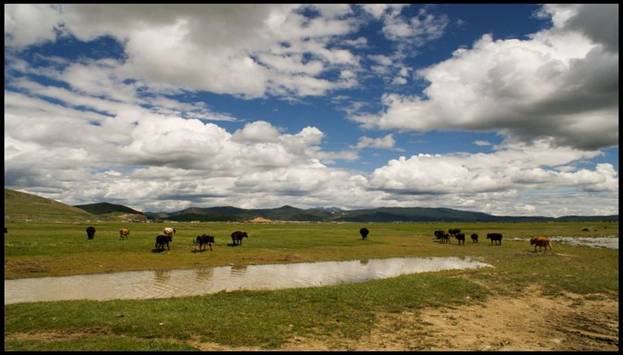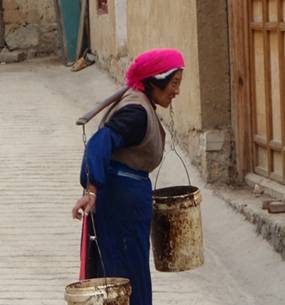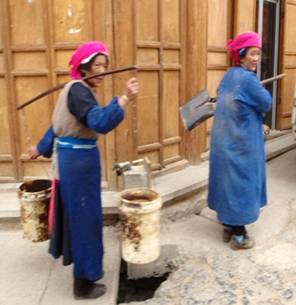27:48.40N 99:42.58E 19th-21st April 2011 Shangrila – (Zongdien is the Chinese name). The name of Shangrila is a fictional place used in the book called ‘Lost Horizon’ written in 1933 by James Hilton. It is a story based on the concept of Shambhala, a mystical city in Tibetan Buddhist tradition. The Lamasery of Shangrila in the book is described as ”a group of colored pavilions clinging to the mountainside with the chance of delicacy of flower petals impaled upon a crag”. 
Gedan Songzanlin Monastery, also called Guihua Monastery, is the largest Tibetan Buddhist monastery in Yunnan province. Construction began in 1679 and was completed in 2 years. It is a faithful imitation of the Potala Palace in Lhasa, Tibet. Two main lamaseries, Shacang and Jikang command the highest position of the architectural complex. They are Tibetan-style watchtowers, and are surrounded by 8 sub-lamaseries and dormitories for the monks. It is said that the Fifth Dalai Lama chose the site of the monastery through divination and named it Gedan Songzanlin Monastery. The 16 colourful pictures hanging high in the hall are said to have been painted by renowned lamas with golden liquid given by the Fifth Dalai lama. Brightened with numerous butter-oil lamps, the hall can hold 1,600 lamas sitting in meditation or chanting the Buddhist scriptures. That was before restoration began, hence the huge crane sticking out from the top of it! 
A Lama’s robe drifing in the wind as he walk past one of the sub-lamaseries  . .
Four Lamas making their way to the staircase to the top Lamaserie, just behind us. Bunty said she saw some of them wearing ‘Croc’s! These young lamas look less well clad I think! 
It’s a steep 550 steps climb to the top though, just as well we had a night to acclimatize ourselves! But it’s very chilly, hence the wooly hat that Bunty is wearing! 
We see this Stupa from the top of the Monastery. They used to have sky burials, where the bones in the dead body are all crushed for the ravens to finish off. The ravens were still swooping around, but the bodies are cremated now, and the ashes put beneath the stupas. 
The landscape and yaks are a very common sight on this high plateau, so cold and high at 3,300 meters! 
We drive across the barren plateau, watching this team of dzomo’s ploughing the fields for growing yellow rape-seed for oil, corn (also grown under plastic as in the fields lower down), and grass. The dzo for male and dzomo for female is a cross-breed of the yak. Some of the black/white pattern may come from cross-breeding with cattle, it uses food more efficiently. 

Christine’s seen a cat in the courtyard of the house we visit for some hot tea, Bunty’s standing in the cold drizzle waiting to go upstairs! 
Yes, we’re rewarded with a modern stove, in this converted farmhouse in the old town, but it’s still a huge space to keep warm! The food was good, a Korean lady bought the place 8 years ago and made it into a restaurant serving Western food with a Tibetan influence. 
Dismantled farmhouses are being rebuilt, these huge beams made from hardwood which come from the forests on the hills behind. We are invited into a typical farmhouse just outside Shangrila, the one in the back of this photo. Each villager takes a turn to allow visitors to the nearby 300 year old monastery to come and have a look around their farmstead. 
The man of the house comes up the stairs to put burning incense holders into the prayer room His hat must have been swiftly put on his head, or maybe that’s the way he likes it! 
This room looks like a mini lamasery, with the area for the visiting lama to sit and pray. 
We are invited into their main living room next to it, to sip some warm yak milk and try the yak cheese which is smoked over the top of the iron pot in the photo – YUK! is what we decided!, although the female yak is actually called Dhri, the Yak is the male! The main reception room, upstairs is huge. But with the smoke going straight out through a hole in the roof, there’s no way that the space is ever warm enough to move about in without thick clothing, as this lady is wearing! Of course they keep warm huddled around the fire, or have large family gatherings and do chanting and singing. 
I reckon that’s what we needed to do to keep warm too! 
Our hostess put on her red hat before going outside, to denote which clan she belongs to.  It’s a matriarchal society here too! These 4 grandmothers must have a combined age of more than 350 years!  
This old lady in the old town is carrying water for her animals. She’s wearing blue because she is a grandmother. As most of the girls are wedded by arranged marriages at the age of 17, she would have been a grandmother by the age of 37 ! 
The old town street of Zongdien, with the largest prayer wheel in the Monastery garden on top of the hill 
I was helping Bunty turn this wheel, but had to stop to take the photo! 
Our guide and driver joined us for our last lunch together at a typical Tibetan restaurant, where the vegetables stir fried with dried yak meat was excellent, even if a little bit spicy with chilli peppers. We’re in the modern part of the town here, it was modernized for the Olympic flame to be carried through the town on the way down from Lhasa in 2008. Tourists thought it was a bomb site during the modernization taking place in 2007. | 
